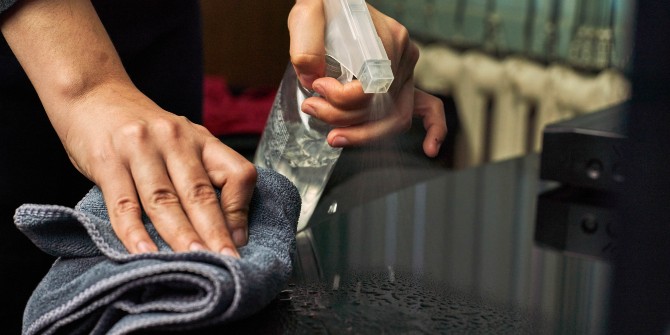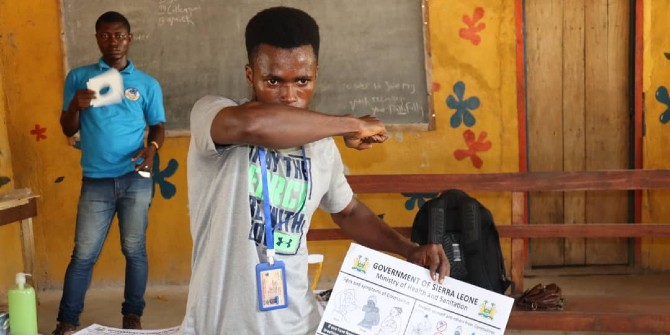Attitudes to vaccination are closely shaped by whether people trust scientists, according to Ben Seyd (University of Kent), Will Jennings (University of Southampton) and Joseph Hamm (Michigan State University). It is important that scientists continue to be seen as providing expert and accurate information, while maintaining their independence from government.
Business and political leaders meeting this month at the World Economic Forum at Davos are focusing on restoring trust. They are pushing on an open door. One of the key lessons we have learned from the pandemic is the importance of trust for effective public health communication and guidance. Tedros Adhanom Ghebreyesus, the Director-General of the World Health Organization, has suggested that “public trust in science and evidence is essential for overcoming COVID-19”.
Scientists have certainly assumed a more public role during the pandemic in providing information and guidance. Yet does this mean that people’s attitudes to scientists – and in particular whether they trust them or not — are as important as made out? Is it not more important that people trust politicians as the main public face of government? And if trust in scientists is so important, where does that trust derive from?
These are among the questions explored in our recently-completed research project conducted in the UK and US. It studied people’s trust in scientists and politicians, using focus groups and online surveys of representative samples of national populations. We have recently published a summary and a full report of our findings, which provide important evidence about the effects of people’s trust in scientists and politicians, and the reasons for their trust in these actors.
The research shows that people’s trust in scientists is closely related to their likelihood of getting vaccinated against COVID. Among the UK population sampled by our survey, almost three quarters (73 percent) of people with high levels of trust in scientists indicated they would get inoculated as soon as a vaccine became available. Yet among people with low levels of trust in scientists, this figure was just over one-fifth (21 percent). Among Americans, the figures are similar: 70 percent of people with high trust in scientists report a willingness to get any future vaccine immediately, while just 16 percent of people with low trust in scientists report the same willingness.
People’s likelihood of getting vaccinated is more closely related to their feelings of trust in scientists than to their trust in politicians
The close association between people’s vaccine willingness and their trust in scientists can be seen in the figure below. This also shows that, in the UK at least, people’s future vaccination take-up is less closely associated with how much they trust politicians. Among Britons, while 73 percent of people who trust government ministers reported a willingness to get vaccinated in future, the equivalent figure among people who did not trust government ministers was still over one-half (54 percent). Yet among Americans, people who do not trust the federal government are much less likely to indicate willingness to get vaccinated in future (at 30 percent) than people who do trust the government (at 70 percent).
Figure 1: Levels of vaccination willingness, by trust in politicians and scientists
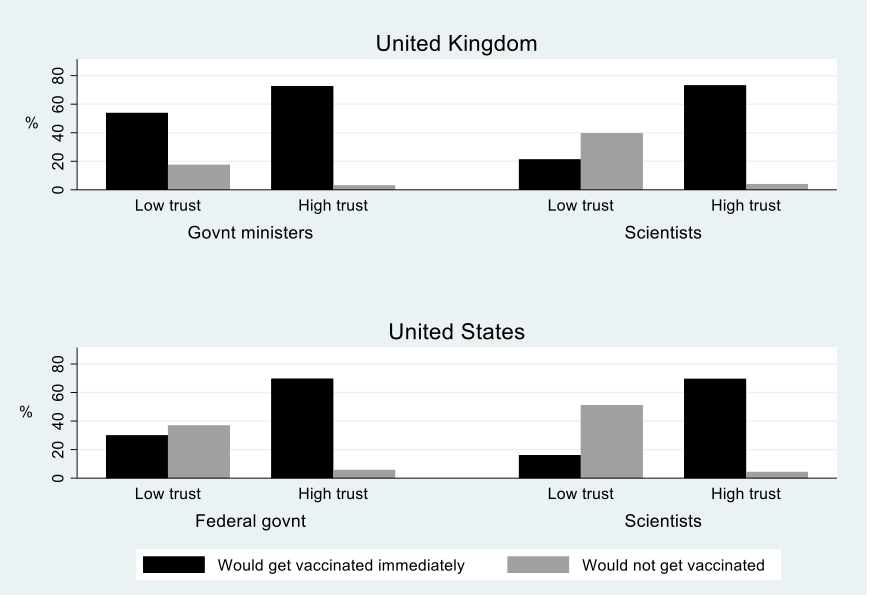
Note: Trust is measured on a 0-10 scale: low trust=0-3, high trust=8-10. Vaccination intention is measured by a question on how respondents would feel about getting a future COVID vaccine. The figures reported are for the option “I would be likely to get any future vaccination as soon as it became available”.
People’s likelihood of getting vaccinated is more closely related to their feelings of trust in scientists than to their trust in politicians. Yet where citizens’ views on health prevention measures become politicised — as in the US — trust in partisan actors like politicians becomes more strongly associated with vaccination behaviour.
Given how central trust in scientists appears to be for important decisions like whether to get vaccinated, what does that trust rest on? The project probed people’s reasons for trusting scientists and politicians in a set of online focus groups conducted in various locations in England. We found that the reasons for trust in scientists were often quite different to the reasons for trust in politicians. Focus group respondents identified their trust in politicians as reflecting appraisals of politicians’ care and concern for ordinary people, and for their honesty and fidelity to promises. By contrast, participants’ trust in scientists was identified as reflecting appraisals of scientists’ expertise and experience. Scientists were trusted for their technical knowledge and capabilities, rather than for how much they showed care for other people.
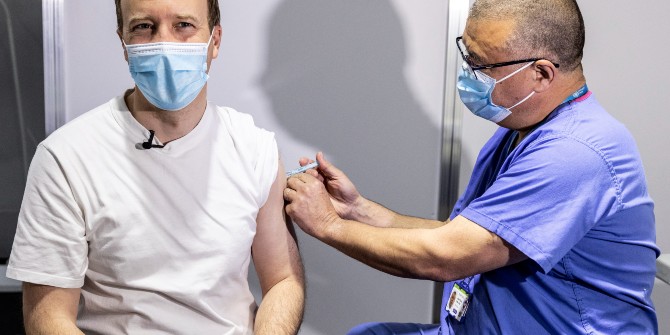
Yet this may not be all there is to people’s reasons for trusting (or distrusting) scientists. Think of the public controversies and censures — the media furore over scientific advisers breaking lockdown rules and MPs’ criticisms of the accuracy and uses of scientific modelling — that have raged during the pandemic. To test how far these types of incident might have affected how people evaluate scientists, we included in our UK and US surveys a question asking respondents to rank the importance of various factors in deciding how much to trust scientists:
- Their scientific background
- How they behave in their everyday life
- The accuracy of the information they provide
- The extent to which they care about people like you
- Whether they are independent of the government
Respondents were asked to rank each on a 1 (least important) to 5 (most important) scale. The results support the findings of our focus groups; people’s trust in scientists is most strongly shaped by scientists’ experience and competence in producing accurate information. In spite of the public controversies attracted by some scientists, scientists’ everyday behaviour and level of care for other people seems to be much less important for public trust. Yet independence from government does seem to be an important consideration for trust.
Figure 2: Reasons for trusting scientists, UK and US
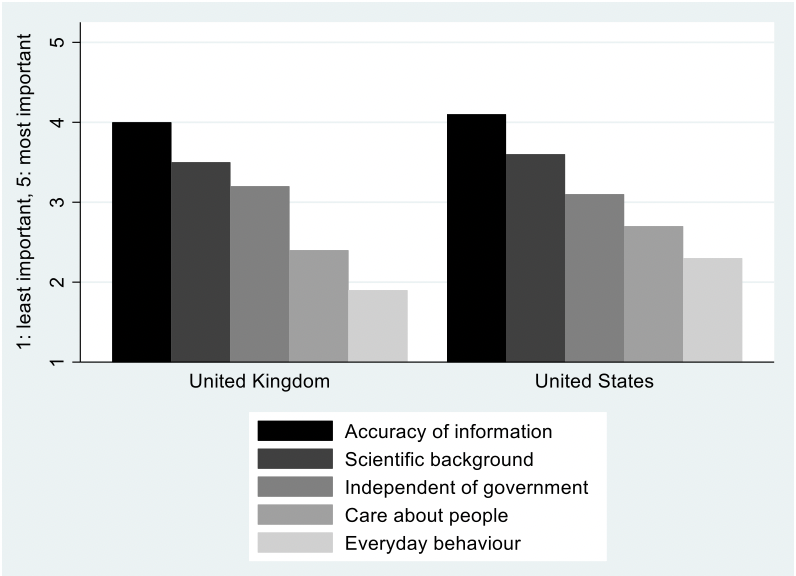
What do the findings of our research project suggest for policy-makers? First, that people’s receptiveness to guidance and advice on public health measures like vaccination are closely associated with how much they trust scientific sources of information. Maintaining high levels of public trust in scientists is therefore vital if people are to abide by public health information and guidance.
People’s trust in scientists is heavily dependent on how experienced and expert scientific advisers are seen to be
In addition, although vaccination uptake is less closely associated with people’s trust in politicians, care must be taken not to politicise public health measures. Arguably, this has happened in the US, where significant sections of the population follow political leaders and reject important public health initiatives like vaccination.
Finally, people’s trust in scientists is heavily dependent on how experienced and expert scientific advisers are seen to be. Trust is less dependent on things like how scientists behave. Yet trust may be compromised if people see scientists as too close to government and, as a result, not as providing impartial and objective information. Careful balancing is required: scientists need to be close to centres of power to inform decision-making, but not seen by members of the public as too close.
Note
The surveys were conducted by Ipsos-MORI between 2-10 Feb (UK) and 2-11 Feb (US). In both countries, nationally representative quota samples of people aged 18+ were interviewed online. Results were weighted to ensure they were representative of the population. The total number of respondents was 1,501 in the UK and 1,499 in the US.
This post represents the views of the authors and not those of the COVID-19 blog, nor LSE.


